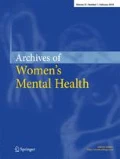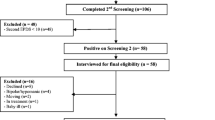Abstract
Dyadic interactions associated with maternal depression and anxiety may perpetuate maternal mental illness and impact infant attachment. Individual and maternal-dyadic therapies are effective but resource intensive. We assessed feasibility, acceptability, and preliminary efficacy of a newly developed maternal-infant dyadic group therapy intervention. This was an open-label pilot study targeting mothers with mood or anxiety disorders, and their infants aged 6 to 12 months. We conducted three 12-week groups combining evidence-based maternal and mother-infant dyadic strategies to enhance mood, insight, parenting, and mentalizing capacity. We measured recruitment and retention rates, reasons for nonparticipation, and missed sessions. Acceptability of the intervention was assessed via questionnaires and semi-structured interviews. Efficacy outcomes were the Parenting Stress Index (PSI), Edinburgh Postnatal Depression Scale (EDPS), and the Beck Anxiety Inventory (BAI), measured pretreatment and posttreatment. The feasibility and acceptability were excellent. There was a significant reduction in mean depressive symptom scores (t 3.31; p 0.008 sig) and a trend toward decreasing anxiety scores (t 1.96; p 0.08). The total PSI score decreased, approaching statistical significance (t 2.23; p 0.057). Enhanced insight, parenting capacity, affect regulation, and positive interaction with baby were supported with self-report surveys and interviews. This resource-efficient novel mother-baby dyadic group intervention shows excellent feasibility, acceptability, and has good preliminary efficacy results. It has the potential to improve depression, anxiety, affect regulation, parenting, and maternal mentalization.
Similar content being viewed by others
References
American Psychiatric Association (2000) Diagnostic and statistical manual of mental disorders (4th ed). Washington
Arteche A, Joormann J, Harvey A, Craske M, Gotlib I, Lehtonen A, Counsell N, Steina A (2011) The effects of postnatal maternal depression and anxiety on the processing of infant faces. J Affect Disord 133(1-2):197–203
Beck AT, Epstein N, Brown G, Steer RA (1988) An inventory for measuring clinical anxiety: psychometric properties. J Consult Clin Psychol 56(6):893–7
Center on the Developing Child at Harvard University (2009) Maternal depression can undermine the development of young children: Working paper #8. http://www.developingchild.harvard.edu
Cicchetti D, Rogosch F, Toth S (2000) The efficacy of toddler-parent psychotherapy for fostering cognitive development in offspring of depressed mothers. J Abnorm Child Psychol 28(2):135–148
Cicchetti D, Toth S, Rogosch F (1999) The efficacy of toddler-parent psychotherapy to increase attachment security in offspring of depressed mothers. Attach Human Dev 1(1):34–66
Cicchetti D, Toth S (1998) The development of depression in children and adolescents. Am Psychol 53(2):221–241
Clark R, Tluczek A, Wenzel A (2003) Psychotherapy for postpartum depression: a preliminary report. Am J Orthopsychiatry 73(4):441–54
Clark R, Tlucek A, Brown R (2008) A mother-infant therapy group model for postpartum depression. Infant Ment Health J 29(5):514–536
Cohen N, Muir E, Lojkasek M, Parker C, Barwick M, Brown M (1999) Watch, wait and wonder: testing the effectiveness of a new approach to mother-infant psychotherapy. Infant Ment Health J 20:429–451
Cornish AM, McMahon CA, Ungerer JA, Barnett B, Kowalenko N, Tennant C (2005) Postnatal depression and infant cognitive and motor development in the second postnatal year: the impact of depression chronicity and infant gender. Infant Behav Dev 28(4):407–417
Diego M, Field T, Jones N, Hernandez-Reif M (2006) Withdrawn and intrusive maternal interaction style and infant frontal EEG asymmetry shifts in infants of depressed and non-depressed mothers. Infant Behav Dev 29(2):220–229
Field T (2010) Postpartum depression effects on early interactions, parenting, and safety practices: a review. Infant Behav Dev 33(1):1–6
Fonagy P, Target M (2005) Bridging the transmission gap: an end to an important mystery of attachment research. Attach Human Dev 7:333–343
Forman D, O'Hara M, Stuart S, Gorman L, Larsen K, Coy K (2007) Effective treatment for postpartum depression is not sufficient to improve the developing mother-child relationship. Dev Psychopatholy 19(2):585–602
Fraiberg S, Adelson E, Shapiro V (1987) Ghosts in the nursery: a psychoanalytic approach of the problems of impaired infant-mother relationships. In: Fraiberg L (ed) Selected writings of Selma Fraiberg. Ohio State University Press, Columbus, pp 100–136
Grienenberger J, Kelly K, Slade A (2005) Maternal reflective functioning, mother-infant affective communication, and infant attachment: exploring the link between mental states and observed caregiving behavior in the intergenerational transmission of attachment. Attach Human Dev 7:299–311
Goodman JH, Prager J, Goldstein R, Freeman M (2015) Perinatal Dyadic Psychotherapy for postpartum depression: a randomized controlled pilot trial. Arch Womens Ment Health 18(3):493-506. doi:10.1007/s00737-014-0483-y
Grossman P, Niemann L, Schmidt S, Walach H (2004) Mindfulness-based stress reduction and health benefits: a meta-analysis. J Psychosom Res 57:35–43
Gump B, Reihman J, Stewart P, Lonky E, Darvill T, Granger D, Matthews K (2009) Trajectories of maternal depressive symptoms over her child’s life span: relation to adrenocortical, cardiovascular, and emotional functioning in children. Dev Psychopathol 21:207–225
Gunlicks M, Weissman M (2008) Change in child psychopathology with improvement in parental depression: a systematic review. J Am Acad Child Adolesc Psychiatry 47(4):379–389
Jardri R, Pelta J, Maron M, Thomas P, Delion P, Codaccioni X, Goudemand M (2006) Predictive validation study of the Edinburgh postnatal depression scale in the first week after delivery and risk analysis for postnatal depression. J Affect Disord 93:169–176
Krusche A, Cyhlarova E, King S, Williams J (2012) Mindfulness online: a preliminary evaluation of the feasibility of a web-based mindfulness course and the impact on stress. BMJ Open 2:1–5. doi:10.1136/bmjopen-2011-000803
Landy S (2009) Pathways to Competence: Encouraging Healthy Social and Emotional Development in Young Children. Second Edition. Paul H Brooks Publishing Co. Inc, Baltimore
Lieberman A (1992) Infant-parent psychotherapy with toddlers. Dev Psychopathol 4:559–574
Loyd B, Abidin R (1985) Revision of the parenting stress index. J Pediatr Psychol 10:169–177
Muir E, Lojkasek M, Cohen NJ (1999) Watch, Wait and Wonder: a manual describing a dyadic infant-led approach to problems in infancy and early childhood. Hincks-Dellcrest Institute, Ontario
Murray L, Cooper P (1997) Effects of postnatal depression on infant development. Arch Dis Child 77:99–101
Murray L, Cooper PJ, Wilson A, Romaniuk H (2003) Controlled trial of the short- and long-term effect of psychological treatment of post-partum depression. Br J Psychiatry 182:420–7
Nelson J (2006) Positive discipline. Ballantine Books of Random House Inc, New York
Newman L, Harris M, Allen J (2011) Neurobiological basis of parenting disturbance. Aust N Z J Psychiatry 45:109–122
Nylen K, Moran T, Franklin C, O’Hara M (2006) Maternal depression: a review of relevant treatment approaches for mothers and infants. Infant Ment Health J 27:327–343
Paris R, Bolton R, Spielman E (2011) Evaluating a home-based dyadic intervention: changes in postpartum depression, maternal perceptions, and mother-infant interactions. Infant Ment Health J 32:319–338
Philipp D (2012) Reflective family play: a model for whole family intervention in the infant and preschool clinical population. Infant Ment Health J 33(6):599–608
Poobalan A, Aucott L, Ross L, Smith W, Helms P, Williams J (2007) Effects of treating postnatal depression on mother-infant interaction and child development. Br J Psychiatry 191:378–386
Reck C, Hunt A, Fuchs T, Weiss R, Noon A, Moehler E, Downing G, Tronick E, Mundt C (2004) Interactive regulation of affect in postpartum depressed mothers and their infants: an overview. Psychopathology 37(6):272–80
Rosignol A, Terradas MM, Puentes-Neuman G, Caron M, Leroux J (2013) L’approche Watch Wait and Wonder et l’évolution de la fonction reflexive parentale de mères à risque. Devenir 4(25):257–283
Schore A (2001) Effects of a secure attachment relationship on right brain development, affect regulation, and infant mental health. Infant Ment Health J 22(1-2):7–66
Shapiro S, Oman D, Thoresen C, Plante T, Flinders T (2008) Cultivating mindfulness: effects on well-being. J Clin Psychol 64:840–862
Slade A, Grienenberger J, Bernbach E, Levy D, Locker A (2005) Maternal reflective functioning, attachment, and the transmission gap: a preliminary study. Attach Human Dev 7:283–298
Smith J, Cumming A, Xeros-Constantinides S (2010) A decade of parent and infant relationship support group therapy programs. Int J Group Psychother 60:59–88
SPSS for Windows, Version 16.0 (2007). Chicago, SPSS Inc.
Steer RA, Ranieri WF, Beck AT, Clark DA (1993) Further evidence for the validity of the beck anxiety inventory with psychiatric outpatients. J Anxiety Disord 7(3):195–205
Toth S, Rogosch F, Manly J, Cicchetti D (2006) The efficacy of toddler-parent psychotherapy to reorganize attachment in the young offspring of mothers with major depressive disorder: a randomized preventative trial. J Consult Clin Psychol 74(6):1006–1016
Tronick E, Beeghly M (2011) Infants’ meaning-making and the development of mental health problems. Am Psychol 66(2):107–119
Turney K (2011) Maternal depression and childhood health inequalities. J Health Soc Behav 52(3):314–332
Underdown A, Shai D (2014) Beyond words: parental embodied mentalizing and the parent infant dance. In: Mikulincer M, Shaver PR (eds) Nature and formation of social connections: from brain to group. American Psychological Association, Washington, pp 185–203
Acknowledgments
The authors would like to to acknowledge the work of Lindsay Elin for her contributions.
Conflict of interest
The authors have no conflicts of interest to disclose.
Author information
Authors and Affiliations
Corresponding author
Rights and permissions
About this article
Cite this article
de Camps Meschino, D., Philipp, D., Israel, A. et al. Maternal-infant mental health: postpartum group intervention. Arch Womens Ment Health 19, 243–251 (2016). https://doi.org/10.1007/s00737-015-0551-y
Received:
Accepted:
Published:
Issue Date:
DOI: https://doi.org/10.1007/s00737-015-0551-y




